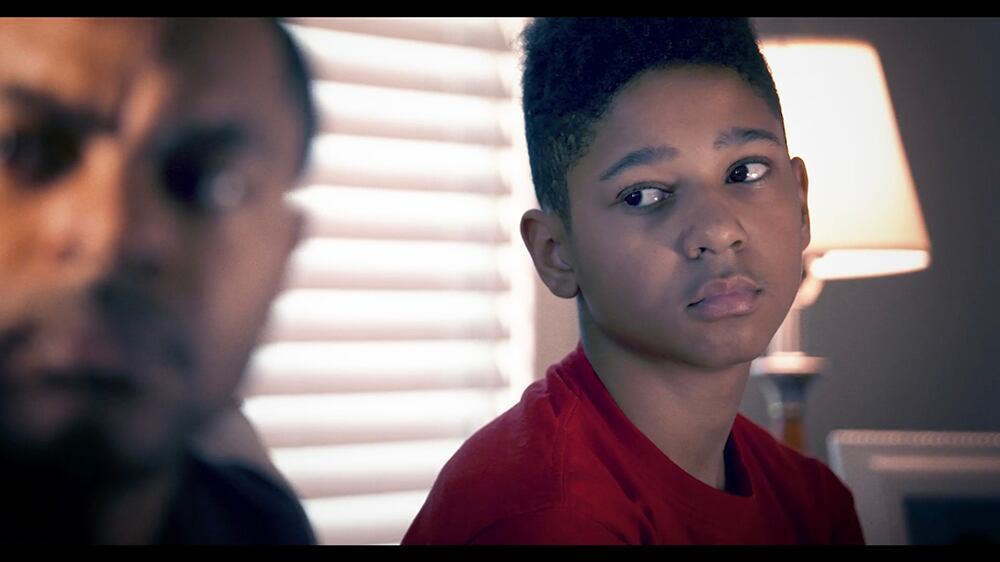On Aug. 15, Portland filmmaker Howard Mitchell's new short preceded Do the Right Thing at the NW Film Center's newly launched drive-in theater.
In some ways, the pairing was natural. Like Spike Lee's 1989 classic, Forgive Us Our Debts depicts an urban neighborhood and its Black residents caught in the cyclical distress of poverty and racism. In its 15-minute runtime, Mitchell's film zooms in on a family of Black Portlanders falling victim to a predatory gentrifier and the police who enforce his practices.
On Sept. 26, Forgive Us Our Debts finds another apt pairing at the Zidell Yards drive-in: The Shining (1980). This time the connection is tonal.
The oppressive dread of Forgive Us Our Debts owes much more to Kubrick than Lee. The threat of violence hovers as a thick, low-lying inhalant, as 13-year-old Trey (Jason Putnam) fields mysterious phone calls, while his grandma (Tracy Shaw) naps to grainy gospel tapes and his father, Dante (Jacques Allison), arrives home on edge and toting a 30-rack.
There's no haunting per se, but you wouldn't be wrong to think some ancient treachery lurked just outside the family's front door. Mitchell certainly views his film as one focused on a violation.
"I wanted to think about the idea of 'home' and make it universal," says the director, who also goes by the pseudonym Gato. "Robert Frost said that home is a place, that when you get there, they have to let you in. Home is yours. No one can take it from you. And yet, we know they can. And rather violently."
Panama-born and New Jersey-raised, Mitchell moved to town in 2009 after flipping a coin: heads Austin, tails Portland. Tails turned up, Mitchell relocated from Seattle, and Forgive Us Our Debts marks his fifth short film, made possible in part by a 2018 fellowship from the NW Film Center. Though Mitchell has captured Portland from a sidewalk vantage before in a series of shorts connected by public transit, Forgive Us Our Debts led him to plunge deep into the city's history of discrimination.
"Police brutality is inextricably linked to the housing crisis," Mitchell says. "It's a two-headed dragon."
Certainly, depictions of police violence against Black civilians have become more frequent in film and TV during the past several years, but rarely with such an emphasis on the grotesque as in Mitchell's work. Backgrounding Trey's after-school routine with a graphic Dante's Inferno coloring book, Mitchell also doubles certain disturbing shots, like a police officer scoffing and grinning at Trey's father's defense of their home.
"It's this idea of the spiritual and the profane crashing together," Mitchell says of his Alighieri allusions. "You have the grandmother representing faith and then Dante bringing in his rage and Black anger. And the boy wrestling with the two between himself."
Put another way, it's uncommon for injustice against Black Americans to be played for horror in film, not drama. Mitchell's work aims to peel open the audience's eyes and force them to stare through Trey's. The director cites classic international cinema like The Spirit of the Beehive (Spain, 1973) and The 400 Blows (France, 1959) as inspirational examples of shedding intellectual bias through a young POV character.
"It's the tabula rasa of a child, that clear mind, unhindered," Mitchell says. "A child is something we're all supposed to identify with. [That] may take the guard off some people."
Relating to audiences while maintaining artistic credibility is something Mitchell often views via his Portland State master's degree: adult education with a critical theory emphasis. As for feeling at home after his fateful coin flip, Mitchell wishes there were more Black filmmakers in Portland, but he also credits the Film Center for supporting his work when he might have otherwise moved away.
Now, it seems, Portland's sometimes hidden hells may have unlocked new creativity in Mitchell, as he develops his first feature: a PDX noir.
"It expounds upon these same themes as a crime drama," Mitchell says. "The mayor is involved, and this Black bike repairman becomes embroiled and has to sleuth his way out of it. I think it's ripe. There's a lot of darkness here."
SEE IT: Forgive Us Our Debts screens at the Cinema Unbound Drive-In at Zidell Yards, 3030 SW Moody Ave., prior to The Shining, on Saturday, Sept. 26. 9 pm. Sold out.
